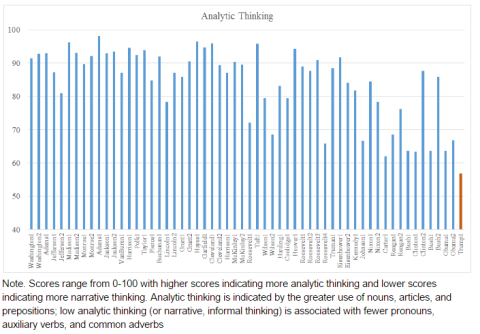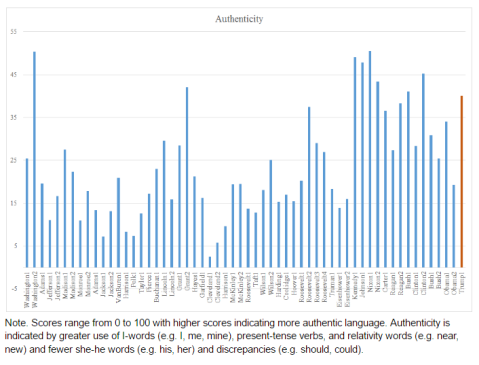Trump’s Inaugural Address
January 21, 2017
Kayla N. Jordan and James W. Pennebaker
University of Texas at Austin
After an unconventional campaign, Trump gave an equally unique inaugural address. In keeping with his populist connection with the voters, Trump spoke in a direct, nuance-free style against the Washington elites and promising to “Make America Great Again.”
Unlike his acceptance speech at the Republican National Convention which was clearly not written by him, Trump (or a speechwriter with a good grasp of Trump’s language style) was the primary author of his inaugural address. Linguistically, it was quite similar to the ways he spoke in his stump speeches, interviews, and debates. Consequently, the conclusions we have reached about his personality and thinking styles in the past are only reinforced after his ascension to the presidency.
Trump is Intuitive and not at all Analytical
In their inaugural addresses, presidents tend to show an analytic thinking style. They generally lay out their ideas in a formal, logical manner. Beginning with Teddy Roosevelt, modern presidents have adopted increasingly informal and narrative styles than their predecessors. Trump, however, has broken new ground in simple and intuitive thinking. As depicted in the graph below, no American president has been so low in analytic thinking.
Consistent with all of his debates, Trump is not capable of more logical and hierarchical thinking. He has rarely made an if-then statement. As evidenced through his tweeting, he is a fast decision maker driven by intuition and hunches. Because of this, scholars must pay particularly close attention to the values that are guiding him — nationalism, isolationism, wealth, security, hard work, and deal-making. When confronted with a difficult decision, he will likely be guided by advisors or the core values that are salient to him at the moment.

Trump is Authentic
Several studies have identified a set of word categories that are associated with people telling the truth. For example, I-words (e.g., I, me, my) often signal that the person is speaking from the heart. Interestingly, when we listen to a person who uses authenticity language, we are more likely to believe them. They come across as more personal and understanding.
From the first debate over 18 months ago, Trump has consistently used words associated with authenticity at very high rates. Indeed, this is his appeal. He shoots from the hip and many people feel he is talking directly to them. Presidents have differed widely in the authenticity of their inaugural addresses. Presidents such as Kennedy, Johnson, and Nixon, surprisingly, gave straightforward addresses clearly laying out their thoughts. Other presidents such as Eisenhower and Truman were more distant and impersonal in their speeches. As shown in the figure below, Trump rivals George “I cannot tell a lie” Washington in his use of authentic language.
Warning: Authentic language does not always mean honest or truthful. LBJ and Nixon may have spoken in authentic ways in their inaugural addresses but history has judged both men as wily and devious in their attempts to get legislation passed. Trump has a long history of making up often-outlandish facts and talking about them with complete sincerity. His language suggests that he actually believes them. In fact, evolutionary biologist Robert Trivers has done a beautiful analysis of deception arguing that the most deceptive people (and other animals) are successful because they are self-deceptive.
Trump, then, may be objectively deceptive but his language reveals that he is generally an authentic individual. He says what he believes without trying to be evasive. He is quick to respond with his open and honest opinion be it during a press conference or on Twitter. For Trump, there is no hiding behind rhetoric.

The Big Picture
Trump’s inaugural address reflects his unorthodox campaign and likely signals the beginning of a different approach to the presidency. Trump continues to buck conventions and differentiate himself from the prototypical politician. His language in the campaign was a stunning departure from the political norms. It is unsurprising that his first speech as president veered so far from the norms.
The language in Trump’s inaugural address matches his language from the election debates suggesting how he approached the campaign is likely to be how he approaches the presidency. Trump likely won’t change his style to appease critics or garner support; he simply is who he is: a straightforward individual who speaks his mind and relies on his gut instincts. Given this remarkable consistency of Trump’s language, the president will likely continue to be an unique political figure.
Helpful References
Ho, S. M., Hancock, J. T., Booth, C., Liu, X., Timmarajus, S. S., & Burmester, M. (2015, May). Liar, Liar, IM on Fire: Deceptive language-action cues in spontaneous online communication. In Intelligence and Security Informatics (ISI), 2015 IEEE International Conference on (pp. 157-159). IEEE.
Newman, M. L., Pennebaker, J. W., Berry, D. S., & Richards, J. M. (2003). Lying words: Predicting deception from linguistic styles. Personality and social psychology bulletin, 29(5), 665-675.
Pennebaker, J. W. “The secret life of pronouns: How our words reflect who we are.” New York: Bloomsbury (2011).
Pennebaker, J. W., Chung, C. K., Frazee, J., Lavergne, G. M., & Beaver, D. I. (2014). When small words foretell academic success: The case of college admissions essays. PloS one, 9(12), e115844.
Trivers, Robert. The folly of fools: The logic of deceit and self-deception in human life. Basic Books, 2011.